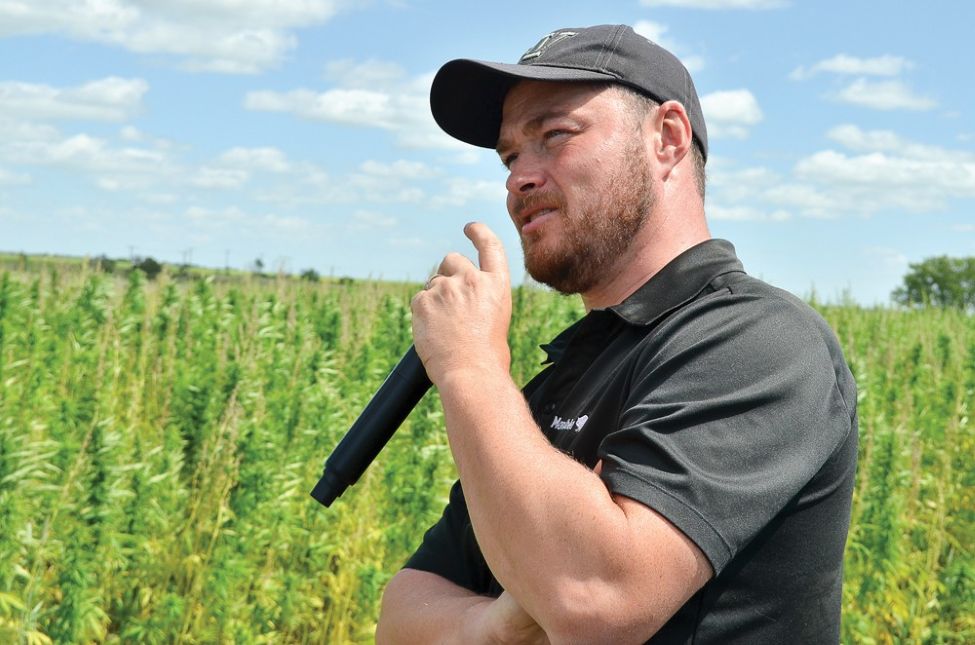With number of recent rains in southwest Manitoba, farmers might be seeing more pests in the field that love this wet, humid weather.
The weather is so unpredictable, says Applied Research Specialist with Manitoba Agriculture's WADO team, Scott Chalmers
"We have a lot of moisture in the ground and in the system in the area and with convective heating, we can brew up storms that may not be quite forecasted as we had thought and would cause a surprise for a local farmer."
Chalmers says he's seeing signs of insect, disease and crop stress in their test trial crops with this high humidity.
"When you get a rainforest on the crop all the things start to grow. So, things I've been seeing in the field are aphids in our soybeans. They're just starting to pop up. They're not in threshold numbers by any means yet, but something to keep an eye on," shares Chalmers.
"I just swung over to the hemp, and I noticed these hop aphids that were just crawling all over the plants and we ended up applying a pesticide for them. And then we have had a few pea aphids on some of our late seeded peas, but the peas were so far along that it didn't really matter. So, we just kind of left them alone.
But we have been seeing some Lagus bugs in our sunflowers and maybe some grasshoppers, you know, punching holes here and there.
I checked out my garden and saw Sclerotinia in my dry beans
"And so, I went and looked at our plots and sure enough, we had quite a bit of Sclerotinia in there. I opened up some canola stands as well and I've seen some verticillium stripe and blackleg ... verticillium and blackleg were definitely present. And that is no surprise to me. You know, we've been pushing rotations in the area, canola-wheat-canola kind of thing. And that's just a recipe for those diseases to keep spreading."
"In some of our other canola plots that have been out of canola for a few years, there's much less disease in those plots with verticillium and blacklegs," adds Chalmers. "So, keep in mind the rotation does matter. And I think given these wet conditions soil borne diseases are really thriving and will cause issues in future years."
Heavy rains and high winds have resulted in lodging in some cereal crops
"With the lodging, you got wet crops sitting on top of itself. There's potential to get some sprouting going, say if it's barley, that's really not what you want," he says. "If you've got to get in there, maybe take the crop off a little tough and start drying it down in the dryers. It's maybe a bit smarter than waiting for that dry day to come, that may never come. So, you know, get out there if you can."
"I think we have to be vigilant combining the crop this year," says Chalmers.
"Something farmers could consider too is planning your use of desiccants for around your harvest," he adds. "Look at the forecast, whether it's a short-term or long-term forecast and kind of make a plan of when you think you might be combining and apply your desiccants accordingly to plan for that date. It can help bring the crop along to a faster maturity when you want it to be on time. That might be money well spent."
"And also, you know if it's something like spring wheat and you're going in with a glyphosate product, it's going to be part of your fall weed control program and take care of those weeds too. And I noticed with all this rain; we've been getting a lot of weeds springing up between the rows that might need a bit of attention."
Let's talk about kochia!
"If farmers are interested, there's a weed program going on right now with kochia," notes Chalmers.
The first confirmed cases of Group 14 herbicide resistance are being documented in Western Canada. With kochia, resistance traits can spread quickly, so it’s crucial to stay vigilant. Regular scouting will be key to identifying and managing potential outbreaks in fields moving forward, say crop experts.
"The province is looking into Group 14 herbicide resistance in kochia and so if you suspect you've got Group 14 contact the province. So maybe you sprayed a product on the field that was a Group 14, but it didn't quite control the kochia as you're hoping. You can call the province at our 1800 number and see if you can send a few samples into the lab. They'll arrange for a pickup or a shipping and get those weeds looked at to see if they're the bad sort," he adds.
